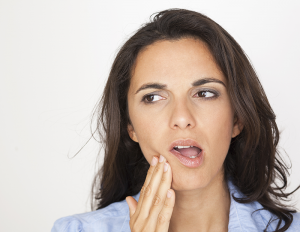
Have you noticed your teeth becoming sensitive to hot or cold temperatures or sugary foods?
Do you wince when brushing or flossing certain areas of your mouth?
Tooth sensitivity can be caused by a number of factors, such as:
- Tooth decay
- Injured teeth
- Cracked teeth
- Worn tooth enamel
- Exposed tooth roots
- Aggressive brushing
- Gum recession
- Gum disease
- Recent dental services
Before you ignore the problem, please consider the following information, to determine what steps you should take.
If your discomfort starts with sensitivity, but the pain lingers for a time after the trigger has been removed, or the pain worsens, this could be a serious dental issue and you should contact our dentist for an appointment to have the problem checked. You could have a tooth abscess (an infected tooth) or a cracked tooth. If so, the pain will likely get worse and could turn into a non-stop toothache. Do not ignore this. Have the problem examined by our dentist.
If you believe your sensitivity is coming from recent dental treatment, it is not normal for this to continue for a long period of time. If the sensitivity is worsening or lasts longer than you were told it might, you should contact our dentist to have this checked. A new filling, crown or other restorative service may need to have adjustments made to the biting surface to achieve the exact fit with the opposing teeth. Once corrected, the sensitivity will go away.
If upon visual inspection of the sensitive area, you can see any discoloration, holes, chips, cracks or breaks in the tooth or an old filling, etc., then you need to contact our dentist. You may have a dental condition which needs treatment before it worsens and the pain becomes more severe.
If you have not seen a dentist for a complete exam and a professional cleaning in the last six months, then you need to schedule a check-up and cleaning to determine what is causing the sensitivity.
If you have noticed yourself clinching your teeth, having tired jaws, more frequent headaches or feel a release of pressure when you wake from a sleep and open your mouth, you may be grinding your teeth at night. The pressure on your teeth from grinding can make the teeth sore. Thus, prolonged grinding can eventually wear down your teeth right through the enamel layer, exposing the underlying layer (the dentin) which is more sensitive. If you suspect this is the problem, you should contact our dentist about a night guard.
If the sensitivity started shortly after either changing to a whitening toothpaste, have received in-office teeth whitening or started using teeth whitening products at home, then you should start using fluoride rinses (either over the counter or prescription strength fluorides from our dentist) and if possible, increase the time frame between the use of whitening products or services.
If the sensitivity began following any form of gum disease treatment or after a cleaning (especially if the cleaning was the first in a number of years) the removal of tartar and calculus may have left root surfaces or weakened enamel exposed which was previously insulated by the built-up tartar on the tooth surface. See the information below to assist you with this condition.
If none of the problems and solutions so far apply to you, you are likely experiencing sensitivity due to weakened enamel or newly exposed root surfaces. Your teeth are covered by a hard layer of enamel which protects the nerves of the teeth. When the tooth enamel is worn away, damaged or a root surface is exposed, then the underlying dentin layer of the tooth is accessible. This layer of tooth is more porous than the enamel, so it allows the nerves to feel more when exposed to heat, cold, food particles and air. This condition can be caused by poor dental hygiene, receding gums, eating acidic foods, prolonged grinding your teeth, brushing too hard or with a hard-bristled toothbrush, too frequent use of whitening products or rinsing with a mouthwash that contains alcohol.
Weakened tooth enamel and exposed root surfaces are the most common causes of increased overall sensitivity. Treatments for this type of tooth sensitivity include:
- Using a desensitizing toothpaste daily
- Using over-the-counter fluoride rinses
- Having fluoride varnish applied at our dental office
- Obtaining a prescription strength fluoride rinse or gel from our dentist for regular home use
- Isolate and reduce the contributing causes of enamel break-down
For more severe exposures to the dentin, you may also be a candidate for one or more of the services listed below, to provide longer term protection. You would need to see our dentist to discuss whether your condition warrants one or more of these services:
- Using a sealant or composite filling material to cover exposed dentin.
- Restoring severely worn teeth with porcelain crowns.
- Orthodontic or TMJ treatments to eliminate excessive grinding and wearing of the teeth.
- Gum surgery, specifically gingival grafting to cover the exposed root surfaces.
Again, tooth sensitivity can be a sign of a dental problem which requires treatment. So, if you have not consulted with our dentist in Lenexa, Kansas, about what is causing your sensitivity, or it has been six months or more since your last complete examination, you need to schedule an appointment. At Seaman Family Dentistry, we will provide you with a comprehensive exam and any options available to treat your specific tooth sensitivity. Contact us now at 913-631-2626 to schedule your appointment with Dr. Robert Seaman. We are looking forward to seeing you soon.


 913-631-2626
913-631-2626